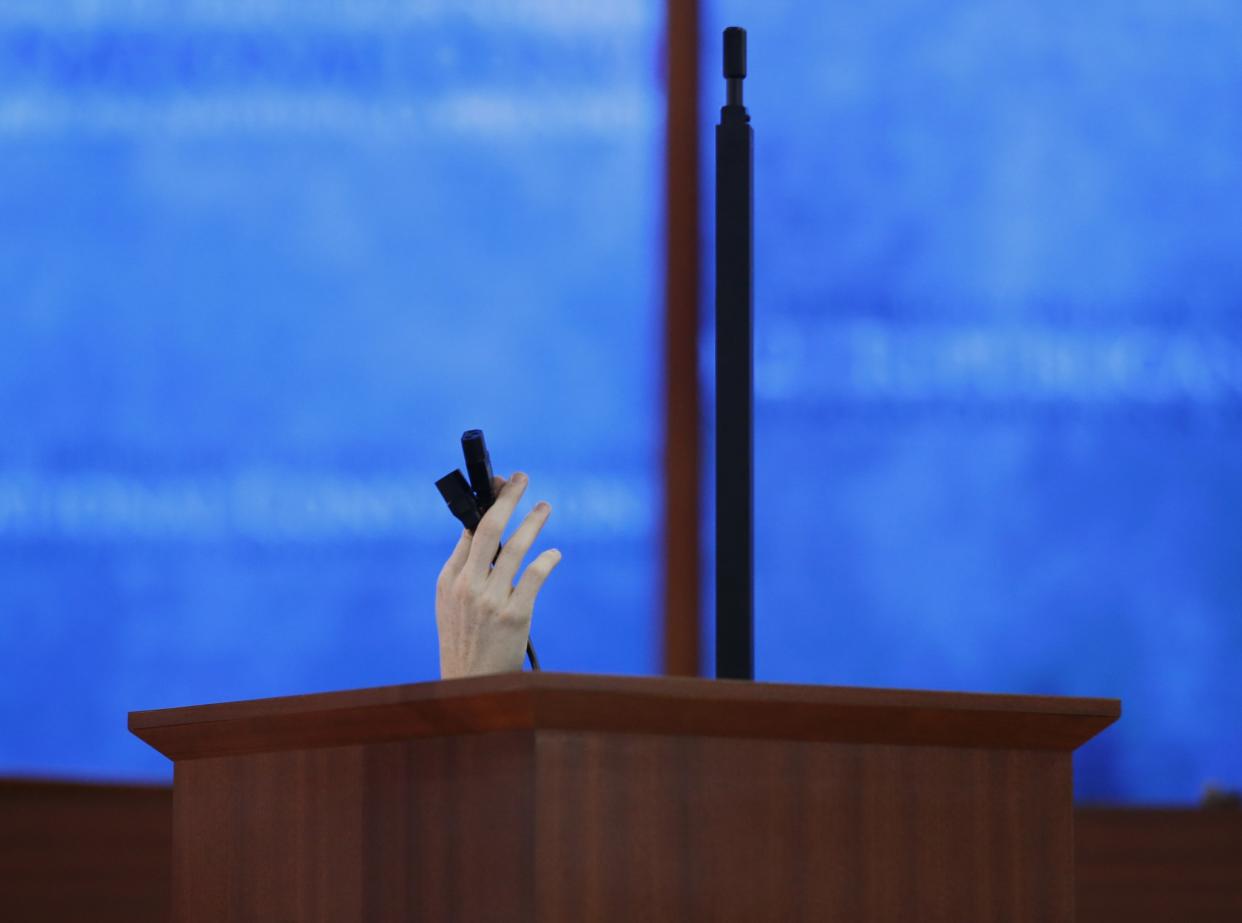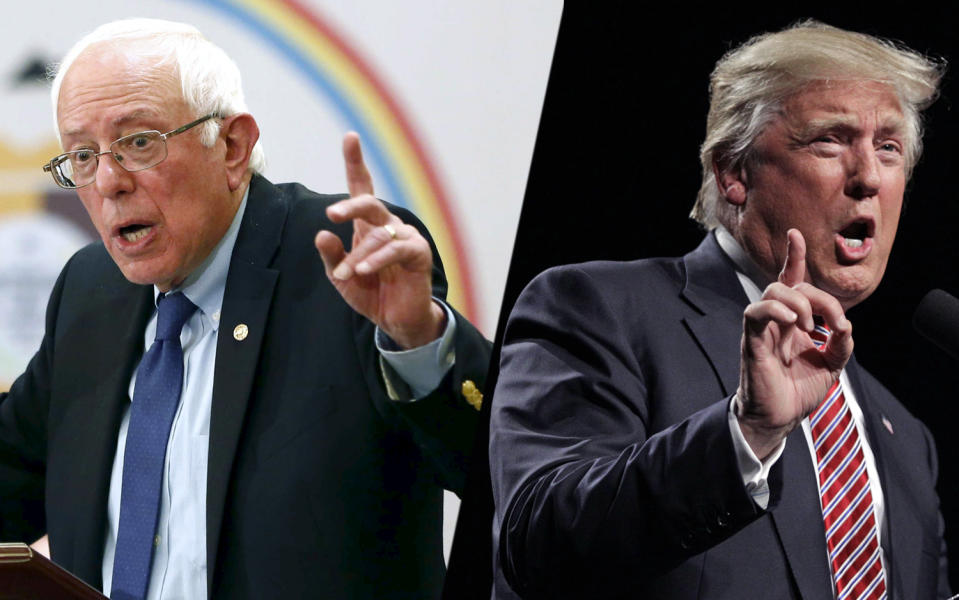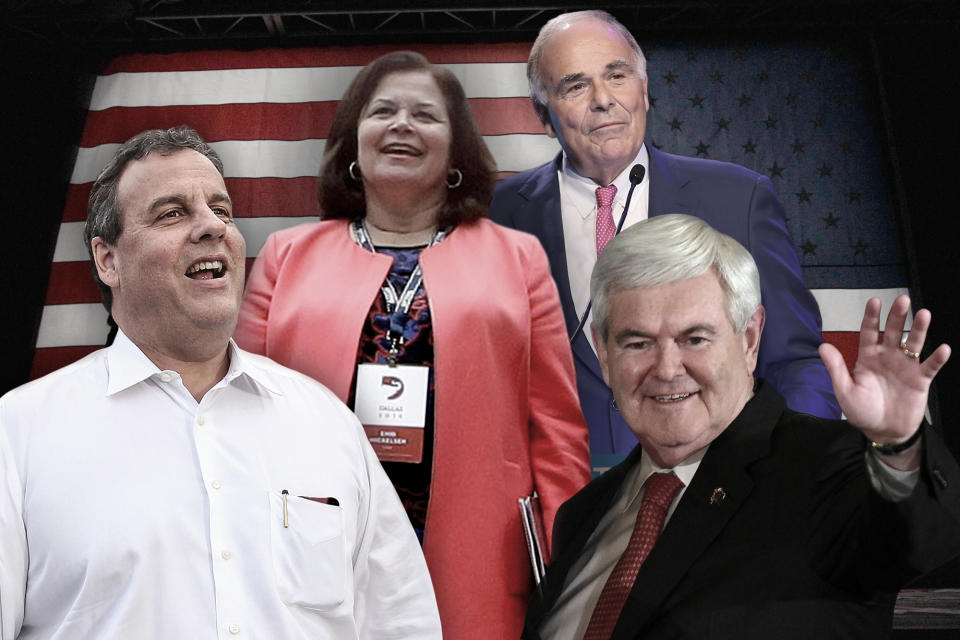Unconventional #31: Politicians have refused. Sports figures have declined. Who’s left to speak at Trump’s convention?

1. Is anyone willing to speak at Trump’s convention?
If you wanted to compile a list of the Republican figures likely to speak at, say, a Republican National Convention, it might look something like this:
Gov. Jeb Bush of Florida. Gov. John Kasich of Ohio. Gov. Scott Walker of Wisconsin. Sen. Kelly Ayotte of New Hampshire. Gov. Brian Sandoval of Nevada. Gov. Nikki Haley of South Carolina. Sen. Rob Portman of Ohio. Former Secretary of State Condoleezza Rice. Sen. Ted Cruz of Texas.
And if you were so inclined, you could keep going:
Former President George W. Bush. Former Vice President Dick Cheney. Former first lady Laura Bush. Former Gov. Arnold Schwarzenegger of California. Sen. Mark Kirk of Illinois. Former Gov. Tom Ridge of Pennsylvania. Former Sen. Tom Coburn of Oklahoma. Former Gov. Luis Fortuno of Puerto Rico. Former Gov. Bobby Jindal of Louisiana. Sen. Lindsey Graham of South Carolina.
We didn’t pick these at random. The first group attended the 2012 RNC in Tampa, Fla., to deliver remarks on behalf of that year’s GOP nominee, Mitt Romney. The second took the stage in 2008, when John McCain accepted the Republican nomination in Minneapolis.
Yet now, all of these Republicans — from both 2008 and 2012 — have indicated that they won’t be speaking at Donald Trump’s convention this summer in Cleveland. Most of them won’t even be attending. And dozens of their fellow GOP leaders — senators, governors, former nominees, even a surviving president — have refused the call as well.
Which raises the question: At a typical nominating convention, more than a dozen people address the American people each night. Will Trump be able to find enough speakers — speakers with the national stature we’ve come to expect from previous conventions — to fill his primetime program? And, if so, who the heck will they be?
Trump has always said his convention would be … unusual. “The last Republican convention was extraordinarily boring,” he has argued. “It’s very important to put some showbiz into a convention, otherwise people are going to fall asleep.”
In part, he doesn’t have a choice. Former Presidents George H.W. Bush and George W. Bush have both excused themselves; same goes for former presidential nominees Romney and McCain. Meanwhile, the roster of Republican politicians who plan to skip the festivities is growing — from rising stars worried about tarnishing their reputations to current reelection candidates concerned that an appearance in Cleveland would hurt them back home this fall.
Earlier this month, for instance, Politico contacted more than 50 prominent governors, senators and House members to gauge their interest in speaking. Here’s what they found:
Only a few said they were open to [speaking], and everyone else said they weren’t planning on it, didn’t want to or weren’t going to Cleveland at all — or simply didn’t respond.
“I am not attending,” said South Carolina Rep. Trey Gowdy, who is overseeing the high-profile congressional Republican investigation into Hillary Clinton’s handling of the attacks on Benghazi. Gowdy, who said he was taking his family to the beach instead, hasn’t gone to conventions in the past and didn’t plan to now.
“I’m not,” said South Carolina Rep. Mark Sanford, a former two-term governor. “But hope you have a good Thursday!”
“Don’t know,” said Sean Duffy, a reality-TV-star-turned-Wisconsin congressman. “I haven’t thought about it.”
Florida Rep. Carlos Curbelo: “I won’t be there.”
Normally, politicians are desperate to mount the convention stage and introduce themselves to a national audience. (It’s how some guy named Barack Obama launched his national political career, after all.) But not this year.
“The widespread lack of interest, Republicans say, boils down to one thing: the growing consensus that it’s best to steer clear of Trump,” Politico concluded.
Trump insists he’s OK with that — which makes a certain kind of sense. Trump won the GOP nomination because he isn’t a politician. Surrounding himself with a bunch of boring politicians wouldn’t exactly be on brand.
And so earlier this month in Virginia, Trump told his fans he was “going to do it a little different.”
“I’m thinking about getting some of the great sports people who like me a lot,” Trump elaborated. He then unveiled his vision of a “winner’s evening,” with sports celebrities and champions addressing the convention rather than “these politicians who are going to get up and speak and speak and speak.”
The only problem? None of Trump’s “winners” seem to want to speak either.
On Tuesday, Bloomberg Politics reported that Trump “campaign aides were lining up several retired athletes, coaches and other sports leaders to appear at the convention.” The roster, according to Bloomberg’s sources, included legendary former Chicago Bears coach Mike Ditka, former Indiana University basketball coach Bobby Knight, NASCAR chief Brian France and former heavyweight champion Mike Tyson.
But Jo Mignano, Tyson’s personal publicist, quickly denied the report. “He’ll be nowhere near Cleveland,” she said of the boxer.
A NASCAR spokesperson speaking on France’s behalf added Wednesday that the racing tycoon “does not plan to speak at nor attend the convention.”
And as for Ditka, he initially told the Chicago Tribune that “no one [had] ever talked to [him] about” speaking and he had “no idea” where the information was coming from. Then Trump himself reached out — and Iron Mike declined.
“I spoke with Mr. Trump this afternoon and he invited me,” Ditka explained. “But I don’t think I’m going to go.”
Even the musicians are balking. Asked by the Washington Post whether he’s attending, Lee Greenwood, who has performed his hit “God Bless the USA” at several GOP conventions, refused to say. And a spokeswoman for Trump fan Ted Nugent told the Post that Nugent is skipping the convention “due to our intensive concert touring schedule.”
So, who’s left?
Well, Knight could still be in the mix; no one has heard from him either way. Trump told the New York Times Friday that he is “thinking about asking Serena Williams, Don King and Dana White, president of the Ultimate Fighting Championship, to play a role of some kind in Cleveland,” and that he wants Sen. Jeff Sessions of Alabama and former Alaska Gov. Sarah Palin — two of his earliest endorsers — to speak. His running mate, whoever that turns out to be, will address the convention as well. (They always do.) And given that the only national politicians who still sound gung-ho about Trump and Cleveland are the ones who want to be his running mate — Newt Gingrich, Chris Christie, Oklahoma Gov. Mary Fallin, Arkansas Sen. Tom Cotton, Former Arizona Gov. Jan Brewer — it’s reasonable to assume that at least some of the runners-up will deliver remarks.
And then there are Trump’s kids.
Families are almost always trotted out at conventions to “humanize” the nominees. In 2012, Romney spoke wistfully about his loving wife, Ann, in a soft-and-fuzzy bio video that also featured interviews with their wholesome children about everyday life in the Romney household, and both Ann and son Craig addressed the convention in person.
But the Trump clan will likely play a more central role at this year’s gathering. If recent reports are correct, Trump’s three eldest children will be speaking in Cleveland — an unprecedented level of family involvement. Ivanka — Trump’s favorite surrogate — may introduce her father when he accepts the nomination Thursday night, a role usually reserved for the candidate’s spouse, and Donald Jr. and Eric are expected to deliver remarks as well. (Potential topics include the Second Amendment, Benghazi and national security.) Trump’s wife, Melania, who is originally from Slovenia and retains a strong accent, is also mulling a speech.
“She’s actually writing some things up right now,” Trump recently told the New York Times.
(Trump himself even considered speaking all three nights — “it would get high ratings” — but eventually ruled it out because he thought it would look like he was “grandstanding.”)
Cleveland is “not gonna be a ho-hum lineup of the typical politicians,” Ivanka said Wednesday in a radio interview. “It’s gonna be a great combination of our great politicians, but also great American businessmen and women, and leaders across industry and leaders across really all the sectors, from athletes to coaches and everything in between.”
The question now is how many of those “leaders” will be named Trump.
_____
2. Former Romney strategist on an independent Romney run: Not such a bad idea?
On Thursday, former Mitt Romney strategist Stuart Stevens gave Yahoo News Guest Anchor Stephanie Sy a behind-the-scenes look at why the Romney family is still begging the former Massachusetts governor to mount an independent challenge to Donald Trump this fall.
“They’re like a big hunk of the country: They look at both of these choices and go, ‘We want another one,’” Stevens said. “It makes sense. Like, ‘Why don’t you run?’”
According to Stevens, Romney seriously considered the idea. “He’s looked at it pretty carefully,” Stevens revealed. “It’s very difficult for an independent to win.”
Even so, Stevens believes a third-party Romney run could ultimately benefit the GOP.
“I think there’s a lot of truth to that, actually,” he said when asked whether Romney could boost down-ballot Republicans. “Right now, Donald Trump is only getting — the Fox poll came out yesterday — 74 percent of Republicans. That’s down from 82 percent. Heading in the wrong direction. Next stop is the 60s. If you’re out there as a Senate candidate, you want to be able to get all those [Republican] voters to vote for you.”
Check out the clip above, and make sure to watch the entire interview here.
_____
3. Sanders offers to pick up the tab for his delegates. Trump tells his: This will cost you.

Little-known fact: Attending a presidential nominating convention is expensive. Even-littler-known fact: Every delegate who isn’t an elected official is expected to pay his or her own way.
The problem with this arrangement is that some delegates can’t afford to come, which is especially problematic for campaigns that actually need all of their delegates to show up.
Absentee delegates haven’t been a huge issue at recent conventions, where there were few if any contested votes. This year’s conventions, however, promise to buck the trend, and at least two candidates — Bernie Sanders and Donald Trump — really, really want all of their delegates to make the trek. Sanders wants his delegates to attend because his dream of rewriting the platform and reforming the primary process depends on it. And Trump wants his delegates to attend because he can’t afford to cede any ground to the various groups that still want to dethrone him in Cleveland.
This week, both Team Sanders and Team Trump sent emails that show they’re concerned. The fascinating thing about these messages is how clearly they reflect the two campaigns’ very different fundraising operations — and their opposing philosophies of governance.
Sanders first. On Tuesday, Sanders’ people dispatched yet another one of their urgent requests for donations. This time, however, the ask was new: “It’s up to you,” the email said, “to decide whether or not our pledged delegates can afford the trip to Philadelphia.”
“Our delegates are not wealthy campaign contributors,” wrote Sanders campaign manager Jeff Weaver in the email. “They’re not party insiders or establishment elites. They’re working folks, and it’s not easy for many of them to fly to Philly and stay in hotels for a week.”
“We expect there could be critical votes for the party platform and electoral process, and we’d hate to fall short on these votes,” Weaver continued. “Make a $2.70 contribution to our campaign before Thursday’s midnight FEC deadline to help our delegates come to the Democratic convention.”
Meanwhile, Team Trump took a different path. Here’s the email that Katie Lagomarsino, Trump’s California delegate director, fired off when she realized Trump still needed an alternate delegate from California’s 13th Congressional District — aka the East Bay, which is one of the state’s most liberal areas:
“You are responsible to cover the costs of your airfare, hotel room, and the $900 delegate fee to the CA GOP to cover costs of food and other items,” Lagomarsino wrote. “The estimated costs run from $3,000 to $5,000. … If you are interested in attending the Republican National Convention in Cleveland, please contact me right away.”
In other words, Sanders is transforming his massive small-donor money machine into a high-tech crowdfunding operation by asking the entire community to chip in to help other people pursue the collective good; Trump is decentralizing authority and telling his supporters that they have to fend for themselves.
Sanders’ message to his delegates: “We’ll pay your way.” Trump’s is the opposite: “This is going to cost you.”
If you weren’t sure which candidate was the socialist and which was the capitalist, now you know.
_____
4. In the arena

Our roundup of the big names making convention news today
In Cleveland, former Utah Rep. Enid Mickelsen, a little-known, Sunday-school-teaching grandmother, will be chairing the all-important Rules Committee — and Republicans don’t seem to know what to make of her. Will she (as a new National Review profile puts it) be “working on behalf of Republican National Committee chairman Reince Priebus to squash dissent and facilitate the uneventful nomination of Donald J. Trump?” Or is she “actually Priebus’s secret, hand-picked sleeper agent, the woman empowered — by party bosses, in case of an electoral emergency — to rig the proceedings in favor of a group of rebels attempting to overthrow” the presumptive nominee? Developing…
The Washington Post reports that Trump’s campaign has started to formally vet possible running mates, with former House Speaker Newt Gingrich emerging as the leading contender, followed by New Jersey Gov. Chris Christie. We previously rated Gingrich’s chances of winning the veepstakes as “not bad, actually”; we described Christie’s as “improving.” So, you know, we told you so.
The chairman of the Democratic convention is “confused” by Bernie Sanders’ endgame. Ed Rendell, the former governor of Pennsylvania and a longtime Hillary Clinton ally, has been working with the Sanders campaign to ensure that it can march through Philadelphia and rally near the Wells Fargo Center. But if Sanders “wants to speak in primetime at the convention, then he has to suspend his campaign,” Rendell recently told the Huffington Post. “If I was leading the movement and I wanted to convince the American people that the movement was correct, then I’d want to speak in primetime. But apparently he must not want to because he hasn’t thrown in the towel.” Referring to the convention, Rendell added, “My guess is it won’t be totally peaceful.”
Cleveland’s most famous chef wants no part of Trump during the RNC. “There’s not a chance I’d let him into one of my restaurants,” Michael Symon said Thursday on a local sports radio show. “I’ve been fortunate or unfortunate enough to meet him through the years. I’m not going to lie, he creeps me out a little bit.” If you are not Donald Trump, however, you should definitely try the smoked pork chop at Lola.
After the ACLU sued, Cleveland earlier this week reduced the size of the restricted zone surrounding the Quicken Loans Arena and redrew the parade route to allow protesters to march hundreds of feet closer to GOP delegates. Bryan Hambley, the young doctor leading what promises to be the convention’s largest anti-Trump demonstration, says he is pleased. “The main thing we’ve learned over the last week has been that Public Square will be open for protesters with signs — previously we had expected more restrictions,” Hambley tells Unconventional. “So, we’ve decided to hold our big rally on the 21st on Public Square, which seems fitting.” Mark it on your calendars.
_____

5. Best of the rest
Anti-Trumpers want a convention coup that starts in the rules committee. Why they won't get one: https://t.co/VFimWAFROL
— Kyle Cheney (@kyledcheney) July 1, 2016
Sanders is itching for a convention fighthttps://t.co/ay2NrXFMtl
— Daniel Strauss (@DanielStrauss4) July 1, 2016
7) "Stop Trump" wants convention fight about "conscience" — this rule hopes to make it about fairness & unity.https://t.co/ujnBJy5qK4
— Ari Melber MSNBC (@AriMelber) June 30, 2016
NEW THIS AM: Who will show up? Who will pay? The many unknowns of the GOP convention. (W/ @daveweigel) https://t.co/BS73VgQtzp
— Ed O'Keefe (@edatpost) June 29, 2016
Trump to announce his VP pick BEFORE the convention, @jwpeters and I report: https://t.co/67XJAObPY4
— Ashley Parker (@AshleyRParker) July 1, 2016
Security zone location, (SOME) road closure details released for Republican National Convention https://t.co/xFFcjLLSqV
— Andrew J. Tobias (@AndrewJTobias) June 30, 2016
This Republican delegate plans to take a Glock 9mm to the Republican National Convention in Cleveland https://t.co/pVrA0gbC7B
— USA TODAY (@USATODAY) July 1, 2016
Are police targeting Black Lives Matters activists ahead of the GOP convention? https://t.co/XXezp4d5Nd pic.twitter.com/6VUlllrDRZ
— Mother Jones (@MotherJones) June 30, 2016
NEW: Cleveland buys $50 million insurance policy ahead of GOP convention https://t.co/Lk8JtEAyO1 pic.twitter.com/YMaFdGDCqZ
— Washington Examiner (@dcexaminer) June 29, 2016
_____
Countdown
For the latest data, make sure to check the Yahoo News delegate scorecard and primary calendar.


